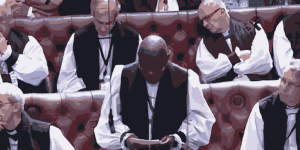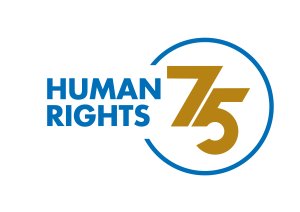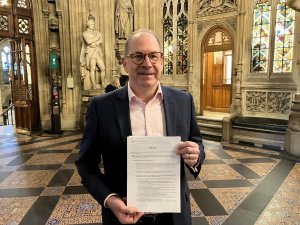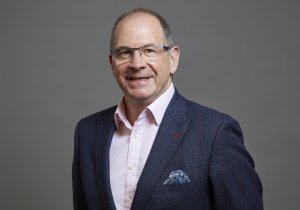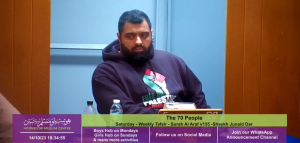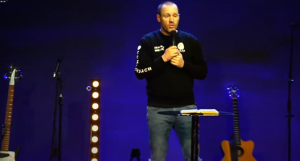Rethinking religion and belief in public life: a manifesto for change
The time has come to rethink religion's public role in order to ensure equality and fairness for believers and non-believers alike, says a major new report launched by the National Secular Society.
The report says that Britain's "drift away from Christianity" coupled with the rise in minority religions and increasing non-religiosity demands a "long term, sustainable settlement on the relationship between religion and the state".
Rethinking religion and belief in public life: a manifesto for change has been sent to all MPs as part of a major drive by the Society to encourage policymakers and citizens of all faiths and none to find common cause in promoting principles of secularism.
It calls for Britain to evolve into a secular democracy with a clear separation between religion and state and criticises the prevailing multi-faithist approach as being "at odds with the increasing religious indifference" in Britain.
Terry Sanderson, National Secular Society president, said: "Vast swathes of the population are simply not interested in religion, it doesn't play a part in their lives, but the state refuses to recognise this.
"Britain is now one of the most religiously diverse and, at the same time, non-religious nations in the world. Rather than burying its head in the sand, the state needs to respond to these fundamental cultural changes. Our report sets out constructive and specific proposals to fundamentally reform the role of religion in public life to ensure that every citizen can be treated fairly and valued equally, irrespective of their religious outlook."
Read the report:
Rethinking religion and belief in public life: a manifesto for change
Add your endorsement to the manifesto for change
Add your endorsementComplete list of recommendations
Our changing society – Multiculturalism, secularism and group identity
1. The Government should continue to move away from multiculturalism and instead emphasise individual rights and social cohesion. A multi-faith approach should be avoided.
2. The UK is a secularised society which upholds freedom of and from religion. We urge politicians to consider this, and refrain from using "Christian country" rhetoric.
The role of religion in schools
Faith schools
3. There should be a moratorium on the opening of any new publicly funded faith schools.
4. Government policy should ultimately move towards a truly inclusive secular education system in which religious organisations play no formal role in the state education system.
5. Religion should be approached in schools like politics: with neutrality, in a way that informs impartially and does not teach views.
6. Ultimately, no publicly funded school should be statutorily permitted, as they currently are, to promote a particular religious position or seek to inculcate pupils into a particular faith.
7. In the meantime, pupils should have a statutory entitlement to education in a non-religiously affiliated school.
8. No publicly funded school should be permitted to prioritise pupils in admissions on the basis of baptism, religious affiliation or the religious activities of a child's parent(s).
9. Schools should not be able to discriminate against staff on the basis of religion or belief, sexual orientation or any other protected characteristics.
Religious education
10. Faith schools should lose their ability to teach about religion from their own exclusive viewpoint and the law should be amended to reflect this.
11. The Government should undertake a review of Religious Education with a view to reforming the way religion and belief is taught in all schools.
12. The teaching of religion should not be prioritised over the teaching of non-religious worldviews, and secular philosophical approaches.
13. The Government should consider making religion and belief education a constituent part of another area of the curriculum or consider a new national subject for all pupils that ensures all pupils study of a broad range of religious and non-religious worldviews, possibly including basic philosophy.
14. The way in which the RE curriculum is constructed by Standing Advisory Councils on Religious Education (SACREs) is unique, and seriously outdated. The construction and content of any subject covering religion or belief should be determined by the same process as other subjects after consultation with teachers, subject communities, academics, employers, higher education institutions and other interested parties (who should have no undue influence or veto).
Sex and relationships education
15. All children and young people, including pupils at faith schools, should have a statutory entitlement to impartial and age-appropriate sex and relationships education, from which they cannot be withdrawn.
Collective worship
16. The legal requirement on schools to provide Collective Worship should be abolished.
17. The Equality Act exception related to school worship should be repealed. Schools should be under a duty to ensure that all aspects of the school day are inclusive.
18. Both the law and guidance should be clear that under no circumstances should pupils be compelled to worship and children's right to religious freedom should be fully respected by all schools.
19. Where schools do hold acts of worship pupils should themselves be free to choose not to take part.
20. If there are concerns that the abolition of the duty to provide collective worship would signal the end of assemblies, the Government may wish to consider replacing the requirement to provide worship with a requirement to hold inclusive assemblies that further pupils' 'spiritual, moral, social and cultural education'.
Independent schooling
21. All schools should be registered with the Department for Education and as a condition of registration must meet standards set out in regulations.
22. Government must ensure that councils are identifying suspected illegal, unregistered religious schools so that Ofsted can inspect them. The state must have an accurate register of where every child is being educated.
Freedom of expression - Freedom of expression, blasphemy and the media
23. Any judicial or administrative attempt to further restrict free expression on the grounds of 'combatting extremism' should be resisted. Threatening behaviour and incitement to violence is already prohibited by law. Further measures would be an illiberal restriction of others' right to freedom of expression. They are also likely to be counterproductive by insulating extremist views from the most effective deterrents: counterargument and criticism.
24. Proscriptions of "blasphemy" must not be introduced by stealth, legislation, fear or on the spurious grounds of 'offence'. There can be no right to be protected from offence in an open and free secular society.
25. The fundamental value of free speech should be instilled throughout the education system and in all schools.
26. Universities and other further education bodies should be reminded of their statutory obligations to protect freedom of expression under the Education (No 2) Act 1986.
Religion and the law
Civil rights, 'conscience clauses' and religious freedom
27. We are opposed in principle to the creation of a 'conscience clause' which would permit discrimination against (primarily) LGBT people. This is of particular concern in Northern Ireland.
28. Religious freedom must not be taken to mean or include a right to discriminate. Businesses providing goods and services, regardless of owners' religious views, must obey the law.
29. Equality legislation must not be rolled back in order to appease a minority of religious believers whose views are out-of-touch with the majority of the general public and their co-religionists.
30. The UK Government should impose changes on the rest of the UK in order to comply with Human Rights obligations. Every endeavour should be made by to extend same sex marriage and abortion access to Northern Ireland.
Conscience 'opt-outs' in healthcare
31. Efforts to unreasonably extend the legal concept of 'reasonable accommodation' and conscience to give greater protection in healthcare to those expressing a (normally religious) objection should be resisted.
32. Conscience opt-outs should not be granted where their operation impinges adversely on the rights of others.
33. Pharmacists' codes should not permit conscience opts out for pharmacists that result in denial of service, as this may cause harm. NHS contracts should reflect this.
34. Consideration should be given to legislative changes to enforce the changes to pharmacists codes recommended above.
The use of tribunals by religious minorities
35. The legal system must not be undermined. Action must be taken to ensure that none of the councils currently in operation misrepresent themselves as sources of legal authority.
36. Work should be undertaken by local authorities to identify sharia councils, and official figures should be made available to measure the number of sharia councils in the UK to help understand the extent of their influence.
37. There needs to be a continuing review by the Government of the extent to which religious 'law', including religious marriage without civil marriage, is undermining human rights and/or becoming de facto law. The Government must be proactive in proposing solutions to ensure all citizens are able to access their legal rights.
38. All schools should promote understanding of citizenship and legal rights under UK law so that people – particularly Muslim women and girls – are aware of and able to access their legal rights and do not regard religious 'courts' as sources of genuine legal authority.
Religious exemptions from animal welfare laws
39. Laws intended to minimise animal suffering should not be the subject of religious exemptions. Non-stun slaughter should be prohibited and existing welfare at slaughter legislation should apply without exception.
40. For as long as non-stun slaughter is permitted, all meat and meat products derived from animals killed under the religious exemption should be obliged to show the method of slaughter.
41. In public institutions it should be unlawful not to provide a stunned alternative to non-stun meat produce.
Religion and public services
Social action by religious organisations
42. The Equality Act should be amended to suspend the exemptions for religious groups when they are working under public contract on behalf of the state.
43. Legislation should be introduced so that contractors delivering general public services on behalf of a public authority are defined as public authorities explicitly for those activities, making them subject to the Human Rights Act legislation.
44. It should be mandatory for all contracts with religious providers of publicly-funded services to have unambiguous equality, non-discrimination and non-proselytising clauses in them.
45. Public records of contracts with religious groups should be maintained and appropriate measures for monitoring their compliance with equality and human rights legislation should be put in place.
46. There should be an enforcement mechanism for the above, which would for example receive and adjudicate on complaints without complainants having to take legal action.
Hospital chaplaincy
47. Religious care should not be funded through NHS budgets.
48. No NHS post should be conditional on the patronage of religious authorities, nor subject directly or indirectly to discriminatory provisions, for example on sexual orientation or marital status.
49. Alternative funding, such as via a charitable trust, could be explored if religions wish to retain their representation in hospitals.
50. Hospitals wishing to employ staff to provide pastoral, emotional and spiritual care for patients, families and staff should do so within a secular context.
Institutions and public ceremonies
Disestablishment
51. The Church of England should be disestablished
52. The Bishops' Bench should be removed from the House of Lords. Any future Second Chamber should have no representation for religion whether ex-officio or appointed, whether of Christian denominations or any other faith. This does not amount to a ban on clerics; they would eligible for selection on the same basis as others.
Remembrance
53. The Remembrance Day commemoration ceremony at the Cenotaph should become secular in character. Ceremonies should be led by national or civic leaders and there should be a period of silence for participants to remember the fallen in their own way, be that religious or not.
Monarchy and religion
54. The ceremony to mark the accession of a new head of state should take place in the seat of representative secular democracy, such as in Westminster Hall and should not be religious.
55. The monarch should no longer be required to be in communion with the Church of England nor ex officio be Supreme Governor of the Church of England, and the title "Defender of the Faith" should not be retained.
Parliamentary prayers
56. We believe Parliament should reflect the country as it is today and remove acts of worship from the formal business of the House.
Local democracy and religious observance
57. Acts of religious worship should play no part in the formal business of parliamentary or local authority meetings.
Public broadcasting, the BBC and religion
58. The BBC should rename Thought for the Day 'Religious thought for the day' and move it away from Radio 4's flagship news programme and into a more suitable timeslot reflecting its niche status. Alternatively it could reform it and open it up to non-religious contributors.
59. The extent and nature of religious programming should reflect the religion and belief demographics of the UK.
Add your endorsement to the manifesto for change
Add your endorsementThe 2017 General Election
A government blueprint for more religious control of schools?
The government's new proposals for education reform in England could see increased discrimination, and most non-faith schools placed in faith-based academy trusts. Alastair Lichten explores the threat to secular education posed by the 'Opportunity for all' white paper.
'Opportunity for all' sets out the government's vision for the future of England's education system. But perhaps the biggest opportunity created is for further religious control of publicly funded schools.
The white paper published Monday contains a few positive proposals and potential opportunities for secularists. However, the central proposal – a renewed push for all schools to academise and join multi-academy trusts (MATs) – poses a grave threat to the future of secular education.
More funding for CofE and other faith-based academies
Establishing a new MAT has costs for any provider, but the paper singles out those "which Dioceses and other religious authorities face" and gives them special treatment by committing to "develop options for financial support". This would put anyone developing secular or community ethos trusts at a disadvantage.
We've long warned that the government's enthusiasm for faith based MATs risks replacing secular oversight of state schools with opaque religious governance. The established church hopes to see local education authorities "wither on the vine" so they can take over this role. In our 2018 report on academisation and its threat to secular education, we revealed almost half of non-faith schools in MATs where potentially governed by faith based trusts, and hundreds had become faith schools. The proposals risk seriously accelerating this trend.
While the paper claims that once moved into MATs "schools will retain their ethos", the DfE have continually failed to set out meaningful protections for the secular ethos of community schools. This is in marked contrast to proposals to protect what is euphemistically referred to as "statutory freedoms" for faith schools that become academies. We should be challenging, not entrenching, the 'freedoms' faith schools have to discriminate when selecting pupils, staff and governors, or when creating their curriculum.
The commitment to "ensuring that all providers of schools with a religious character remain able to open new schools, once all schools are in trusts" has two worrying implications. The most obvious is more non-faith schools taken over, or faith schools forced under tighter control. But this could also herald another attempt to introduce new 100% religiously selective academies.
New attack on the 50% cap
Currently new academies (free schools) have a 50% cap on religious selection of their pupils. This has meant some religious groups (principally the Catholic Education Service) that wish to practice up to 100% religiously discriminatory admissions have had to propose voluntary aided schools instead. These face comparatively more scrutiny and opportunity for public opposition, so have been less successful. If the government want "all providers" of faith schools to continue opening new schools, and for all new schools to be academies, they may be preparing to weaken the 50% cap.
Rural schools
Protections for rural schools may also lead to increased religious control. Most rural primary schools are already faith based, and 47% of families in rural areas already face "high" or "extreme" restrictions on the choice of a non-faith primary school.
All these schools (faith and secular alike) may now need to join MATs, and Church run diocesan trusts are likely to be the only supported and established option. The idea of a community school free from church control could entirely disappear from large parts of rural England.
Admissions
The paper promises to deliver "fair admissions across England", including strengthening the role of local authorities to provide "fair admissions for their local areas". They even promise to "work with local authorities, trusts, schools and parents to develop options to reform the admissions framework, including the setting of over-subscription criteria".
Mention of religious discrimination and selection is conspicuously absent. But any discussion of admissions reform provides an opportunity to get this on the agenda.
Strengthening RSE
A commitment to "strengthen Relationships, Sex and Health Education" (RSE) guidance is positive. Current guidance undermines RSE by allowing schools to teach through a discriminatory, limiting or shame based religious ethos, and emboldening regressive religious groups targeting schools which do teach inclusive, comprehensive RSE.
Tackling illegal schools
The NSS has been pivotal in challenging unregistered, illegally operating faith schools. These are often deliberately unregistered to avoid safeguarding or education quality regulation. The commitment to "introduce legislation" to strengthen Ofsted's powers in this area is welcome. But such reforms are overdue and need to be coupled with support for local authorities.
What's next?
White papers set out broad principles not specifics. We will be engaging with the government over these proposals, seeking clarity where necessary, opposing greater religious influence, and supporting positive reforms. If you support our call for true equal "opportunity for all", then please consider joining the NSS, or supporting one of our campaigns.
An inclusive Britain starts with inclusive schools
Keeping religion and state education separate is the best way of ensuring schools promote free inquiry, equality and inclusivity, argues Stephen Evans.
Last week the government published its 'inclusive Britain strategy', setting out a range of actions to tackle racial and ethnic disparities and promote fairness.
A glaring issue overlooked is that of faith schools. Robust evidence shows that faith-based education builds discrimination into the system and undermines social cohesion by segregating pupils on religious, ethnic, racial and social grounds.
A third of state-funded schools across Britain are faith schools. The vast majority are Christian, and many of these operate discriminatory admissions policies. The impact of this is being keenly felt by families in Liverpool, where parents are struggling to access local schools, and youngsters are facing long journeys because nearby places are reserved for practicing Christian families.
Dr Amina Elmi from the Granby Somali Women's Group has been lobbying for a change in schools' admissions, arguing that admission policies are stopping "people from a certain community - from a certain race or faith - from getting into the schools in their locale".
The problem is acknowledged by local councillor Tom Logan, cabinet member for schools, who points to "a cluster of schools with a religious element to their admissions policies so if you're not Catholic or from the Church of England or you don't want a faith-based education, you'll find it difficult to get a place". Many parents up and down the country will have faced a similar situation.
The government's inclusive Britain strategy is focussed on addressing racial and ethnic disparities, but it's clear that a broader review is needed to address the myriad ways faith schools at best fail to foster, and at worst actively undermine, inclusiveness.
But there are encouraging signs that an increasing number of local people are willing to call out discriminatory admissions and make some noise. One such group is Fair Schools for Oldham, a group of parents, teachers, and local residents who got organised after they realised their new "multi-faith, multi-ethnic, inclusive school" was going to reserve 50% of its places for children of families that practice a faith – meaning half of its places will be closed to many local children. The group says it wants everyone to have equal access to good quality local state-funded schools, "regardless of their social class, religious faith, ethnic origin, or postcode".
Parents in Wigan are also fighting the unfairness of faith-based education. The council's plans to close a community school there will leave many families with no option other than a faith school. This in an area where the high prevalence of faith schools means 90% of families already face high or extreme restrictions on the choice of a non-faith school. Three in ten families across the country face similar restrictions.
Even when children are given a place in a faith school with a religious outlook they don't share, the faith ethos permeates all aspects of school life, making it far from an inclusive environment for many. Even non-faith-based academies and community schools are under a legal obligation to provide a daily act of broadly Christian worship, further undermining inclusivity. The only schools that do a good job of holding inclusive assemblies are those that ignore the law and omit the worship.
But the inclusivity problems in our schools go further than alienating children from different religion or belief backgrounds.
The disinviting of a gay author from a state-funded Catholic faith school in Croydon this month highlights how religious control of schools can negatively impact on inclusivity for LGBT pupils and families too.
The reason given by the Archdiocese of Southwark for cancelling the visit of award-winning children's author Simon James Green was that his representation of LGBT characters and support for LGBT rights was in conflict with their religious ethos.
The diocese says: "At the heart of every Catholic school sits the person of the Lord Jesus Christ and the teachings of the Catholic Church." Herein lies the problem. According to the Catechism of the Catholic Church, "homosexual acts" are "acts of grave depravity", "intrinsically disordered" and "contrary to the natural law." Our publicly funded schools shouldn't be agents of religious dogma.
The National Secular Society has long argued the requirement for faith schools to teach RSE and PSHE in accordance with their religious ethos creates significant tension with their duties under the Equality Act – and provides cover to marginalise LGBT pupils and stigmatise same-sex relationships.
NSS research revealed 77% of secondary faith schools in England are delivering Relationship & Sex Education according to the teachings of the school's religious ethos, rather than in an impartial manner. Many Catholic schools' RSE policies often explicitly denigrated same-sex relationships, or otherwise marginalised or excluded discussions of LGBT issues and representation of LGBT individuals.
Chair of the Catholic news weekly The Tablet Mike Craven says the treatment of Simon James Green "reinforces public perceptions of Catholics as prejudiced and Catholic schools places where teachers are second-guessed by bishops and bureaucrats and laity are ignored and marginalised." He says it will lead taxpayers and politicians to question why hundreds of millions of pounds of public money are being spent to allow a religious institution to reinforce public prejudice against a vulnerable group of young people." Quite.
He questions whether the prohibition on the physical expression of love outside heterosexual marriage is still tenable. That's a matter for the Catholic faithful and the Church. Religions will always have their internal theological disputes. These should be played out in churches, mosques, synagogues and temples, not schools.
There's no shortage of people who claim that religion is a force for good. And in many ways, it can be. But that's not the whole story. It can also be intolerant, divisive and discriminatory.
State education can play a vital role in creating a fairer, more open and more inclusive society. To achieve that, the schools we all fund should be equally welcoming to children of all religion or belief backgrounds, ethnicities and sexual orientations.
An inclusive Britain begins with inclusive schools. We need an education system that, at its core, promotes free inquiry, equality and inclusivity. Organised religion's continuing role in state education is a glaring impediment to that. That's why religion and state education must be kept separate.
Religious education isn’t the right vehicle for civics
The government thinks religious education is important for developing children's critical thinking, values, and understanding of different traditions. There are much better ways to achieve this than through the outdated subject of RE, argues Stephen Evans.
In recent years there's been a steady stream of reports recommending reform of religious education – a contentious subject widely regarded as out of date, underfunded, unpopular and lacking a clear purpose.
The government has shown little enthusiasm for addressing RE's myriad problems. It has instead supported the subject remaining on the curriculum even though its original narrow doctrinal purpose has changed irrevocably. It also seems cravenly weak in the face of clerics and religious groups who regard RE as their territory.
But an insight into the government's current thinking on RE has been provided in responses to parliamentary questions about the subject's "societal value for young people".
Summarising the responses, the government thinks religious education is important for:
- developing children's knowledge of British values and traditions, and those of other countries.
- developing children's social skills and empathy.
- developing skills of critical enquiry, creative problem-solving and communication.
- developing knowledge and understanding of the religions and beliefs which form part of contemporary society.
- promoting mutual respect, understanding and tolerance in a diverse society.
- promoting shared values and challenging racism and discrimination.
These are worthwhile objectives. But surely this is a vision for a civics or citizenship education, not religious education. If this is what the government wants to achieve, the subject should be uncoupled from the religious interests that currently control it and called what it actually is.
At present the law requires all state-funded schools, including free schools and academies, to provide RE as part of their curriculum. The subject, along with a daily act of Christian worship, has been compulsory for the entirety of a pupil's school life since 1944.
The point then was to inculcate Christianity. Now, religious instruction has largely given way to a more non-confessional approach in community schools. But in faith schools, the subject is controlled by religious authorities and still used to inculcate religious viewpoints. The subject is even inspected by religious bodies, rather than the state. Not only does this undermine the subject's credibility, but it also restricts pupils' freedom to develop their own beliefs – the opposite of education.
Even away from the faith schools the subject is an anachronistic anomaly in that the curriculum content is determined locally by committees dominated by faith groups. These committees were originally set up in the very different world of 1944 and have long outlived their usefulness.
The privileging of religion in the way the subject is arranged, and the legal framework that underpins it, is outdated and hard to justify. It is noteworthy that government statements never do attempt to offer any justification for the retention of the 1944 framework.
Schools have a role to play in teaching young people about the diversity of religion and belief in the world they live in, but does it really need to be a subject in its own right?
The time has surely now come to consider dispensing with the whole concept of religious education.
This would free up time for a renewed emphasis on citizenship, an area of learning that provides young people with the knowledge and skills needed to understand, challenge and engage with democratic society. It is a part of the curriculum that encourages pupils to consider religious and other forms of diversity around them – and to understand their rights and responsibilities as citizens. The ethical debates that pupils need to have would still be there, but without the inbuilt assumption that values and morality all flow from religion.
Faith leaders might not like it, but their privileged influence over state education is unjustifiable and needs to be challenged. Education should serve society and its future citizens, not religious interests.
Ensuring every pupil has an entitlement to impartial knowledge about different worldviews makes sense. Equipping young people with a working knowledge of a range of religious and nonreligious beliefs will help them to navigate the increasingly diverse world around them.
But an in-depth understanding of the world's religions isn't a necessary pre-condition for a peaceful and tolerant society. Moral and political virtues such as civility, citizenship, tolerance and inclusivity, coupled with an awareness of and respect for human rights, will nurture greater harmony and social cohesion. These shared values should be promoted throughout our schools. Religious education isn't the appropriate vehicle for that.
Recent studies agree: the risks of circumcision outweigh any benefits. It’s time to rethink our permissive approach to genital cutting.
Dr Antony Lempert says the findings of two recent medical papers critical of infant circumcision should prompt us to greater protect children from religious and cultural genital cutting.
Two recently published medical articles have highlighted the dangers of the most common surgical procedure worldwide – and one that is performed almost exclusively for religious or cultural reasons on children too young to consent.
Infant male circumcision is widely acknowledged to be a non-therapeutic (i.e. medically unnecessary) procedure which is not actively recommended by any medical association in the world.
There are nonetheless many claims that it does confer some medical benefit on children and men, or that it is at least harmless. Medical benefit is often hailed as a coincidental advantage by religious leaders who wish to protect their traditional forced genital cutting practices from criticism or limitation.
But these two articles demonstrate otherwise.
The first, by Matthew Deacon and Gordon Muir and published in Nature, analyses the evidence behind the most common claims of the apparent benefits of circumcision, such as preventing urinary tract infections, sexually transmitted diseases and penile cancer. It picks out the flaws in previous studies sometimes cited as proof of these supposed benefits, and finds that most are generally outweighed by risks. Complications that can result from circumcision, the review paper finds, include bleeding, infections and impaired sexual function, in addition to the excruciating pain the procedure inevitably causes.
The article concludes: "From the perspective of the individual boy, there is no medical justification for performing a circumcision prior to an age that he can assess the known risks and potential benefits, and choose to give or withhold informed consent himself."
The second article, published in European Urology Focus, finds from research at a Canadian hospital that the risks of neonatal circumcision are "greater than generally assumed". From 2000-2013, 19 previously healthy newborn babies were admitted for acute complications following circumcision. Eight boys required surgery, three for severe bleeding. Seven were admitted to an intensive care unit, and two of these died.
Because circumcision is unregulated here, little data on complications is available in the UK. But the evidence that does exist is consistent with these findings. In 2011, Birmingham Children's Hospital admitted 11 baby boys to the paediatric ICU with life-threatening complications from circumcision.
The potential for such complications might be considered an acceptable risk of surgery performed to treat medical problems. Yet when the surgery is performed on a healthy, non-consenting child who has not yet had the opportunity to experience sex with intact genitals, there are no substantive arguments to justify placing that child at risk of such serious harm.
It is a singular anomaly that non-therapeutic circumcision continues to take place despite lack of a medical indication or even evidence of overall benefit. This turns medical practice and child safeguarding on its head. Most medical interventions start with an evidence base of benefit before even considering the risk/benefit ratio; the information is subsequently offered to patients who can then make an informed choice.
Children are usually given special safeguarding protections because of their vulnerability. In practice this means parents can consent on behalf of their child, in the child's best interests, to medically necessary procedures recommended by doctors. For obvious reasons, parents do not usually have the right to demand that doctors or others perform medically unnecessary surgical procedures on their children. There is no medical, ethical or child safeguarding reason why ritual genital cutting of male infants and small children should be the sole exception to this rule. Rather, there is every reason to treat ritual male circumcision of non-consenting children as a significant safeguarding concern.
Most people cherish agency over their own body, especially their genitals. Intact men recognise their foreskin as a sensitive, functional, erotogenic intimate part of their body; it would be a serious sexual assault to surgically remove the healthy foreskin from a non-consenting adult man.
That society values autonomy so much that we permit people to refuse even life-saving surgery, for example the removal of cancerous limbs, only serves to highlight the unjustifiable contrast between the rights of adults and the lack of protection afforded to male babies, children and the adults they will become.
These two latest papers add to a large and growing body of evidence that cutting healthy parts off the genitals of non-consenting, vulnerable people is not medically justifiable and can cause serious harm. There can be no justification for more children to be subjected to this procedure, which is usually requested by parents to concord with the parents' religious or cultural affiliations.
Wounding children without an explicit medical reason will usually result in child safeguarding procedures and sometimes to prosecution of the perpetrators. Ordinarily, religious or cultural reasons will not serve as an excuse. The courts have consistently ruled that ritual scarification, flagellation and the cutting of female genitals (FGM) on children cannot be justified even if they are central to the religious or cultural beliefs of the child's parents or community.
Yet no jurisdiction in the world prohibits the painful, risky and permanent procedure that is circumcision from being performed on young male children. While some jurisdictions, notably Iceland, have attempted to ban non-therapeutic infant circumcision, intense lobbying from religious groups has thus far proved an insurmountable barrier.
Things need to change. While we continue to give free rein to individuals to perform circumcision on babies without medical need, we're failing the thousands of boys who would have otherwise refused this lifelong modification to their bodies.
And, saddest of all, we'll continue to see babies die wholly preventable deaths from a wholly unnecessary procedure.
Image: StockSnap, Pixabay
Appointments of future archbishops shouldn’t be the state’s business
Church of England plans to give Anglican church leaders from around the world greater power in choosing future archbishops of Canterbury serve as a reminder of the need to separate church and state, argues Stephen Evans.
A row is brewing over a possible change to the process for deciding who becomes the most senior cleric in the established Church.
The Church of England is currently consulting on plans to allow overseas Anglican leaders from churches around the world to be given much greater power in choosing future archbishops of Canterbury.
According to The Times, "English priests and worshippers have expressed surprise and anger at proposals for a five-fold increase in the power that Anglican churches overseas will be given in nominating the Church of England's most senior bishop."
Their concerns centre around whether the proposals might diminish the prospect of a woman or a supporter of same-sex marriage being appointed as archbishop of Canterbury, as many Anglican churches globally still do not allow women to become bishops and most steadfastly oppose the idea of conducting gay marriages in church.
But it isn't only the Anglican faithful who might have cause to be concerned.
Through the Church's established status, the archbishop of Canterbury enjoys a significant degree of political power in the UK. This raises important questions about the appropriateness of foreign influence.
He and his bishops claim 26 seats in the House of Lords which provides unique access to the corridors of power. He is given his own annual debate to lead in parliament, has meetings with the prime minister and government ministers, and enjoys a myriad of other privileged platforms.
This extends to state occasions including coronations, which give the archbishop inappropriate political influence in a country that really should be secular. His position is charged with anointing our head of state and administering the oath, whereby the monarch vows to "maintain in the United Kingdom the Protestant Reformed Religion established by law".
And let's not forget the influence over public policy gained through the Church's role in state education. One quarter of all publicly funded primary schools in England are run by the Church – the largest single provider of schools in the country.
Overseas influence in who fills this role can only widen the democratic deficit of this ludicrous arrangement. The current bishops' bench in the House of Lords has already been described by the incumbent archbishop Justin Welby (pictured) as "the most orthodox since WWII." Greater influence from reactionary bishops from around the world can only further intensify the disconnect between the Church and the country's increasingly secularised population.
But who leads the Church of England – and the wider international Anglican Communion –should really be nobody's business but the Anglicans'. Disestablishing the CofE and ending its privileged role in our state institutions will ensure this is the case.
Regrettably, the current constitutional settlement makes it impossible for the question of who leads the Church of England to be purely an internal matter for the Church, the way it would be for any other religious denomination.
At present the decision is made by the reigning monarch on the advice of the prime minister, who in turn receives a shortlist of two names from an ad hoc committee called the Crown Nominations Commission.
Boris Johnson's baptism into the Catholic faith called into question the prime minister's role in all of this and highlighted the absurdity of an established church in a modern pluralistic, multifaith democracy.
Establishment is a relic from an age when church and nation were indistinguishable one from another. Today, fewer than 1% of England's population attend church on a typical Sunday. Younger people are increasingly unlikely to identify with any faith. And surveys suggest that a majority of the UK public don't belong to a religion. This reality should be reflected in a new, secular, constitutional settlement.
Then, questions about who becomes the archbishop of Canterbury can be a matter solely for Anglicans to decide – which is the way it should be.
Image: Copyright House of Lords 2021 / Photography by Roger Harris
Playing whack-a-mole with religious charities isn’t working. Time to reform charity law.
Regulating charities effectively will not be possible until religious privilege is removed from charity law, says Megan Manson.
The Charity Commission for England and Wales has a lot on its plate. It regulates over 185,700 charities, and actively seeks to register more – including more religious charities.
It's therefore laudable that despite its heavy workload, the commission is keeping its ambitions high in its 2021-22 business plan. The plan's aims include "keeping charity relevant" and continuing to "put the public interest front and centre of our approach to regulating charities".
The National Secular Society, which campaigns for religious and non-religious charities to be held to equally high standards, naturally supports these aims. But without fundamental reform to charity law itself, the commission will be unable to truly realise its objectives.
According to charity guidance, charities must serve a public benefit and must not promote extremism. But over the years, the NSS has reported dozens of charities to the commission for promoting extremist ideas, including homophobia and misogyny, through their websites.
What do these charities have in common? They're all registered under the charitable purpose of "the advancement of religion". The harmful ideas they promote are rooted in the particular religion each one is advancing.
Out of all these cases, only two appear to have resulted in significant action from the commission. After the NSS reported them for serious failings, the commission appointed interim managers to Kingdom Church GB and Islamic Research Foundation International, which now puts the future of those charities in question.
However, in all other cases, the charities remain in operation and no significant action appears to have been taken.
To the commission's credit, in the majority of cases most of the harmful content we reported was removed from the websites.
But is this sufficient? For many of these charities, the website is only a minor part of their communication. Most of their public engagement will be via a place of worship. Unless the charity routinely records and publishes its sermons, there is no way to know whether the extremism, homophobia and misogyny purged from its website continues to be repeated in its church or mosque. And that's before we consider the books, pamphlets and other materials charities produce or distribute – all virtually tax-free, of course – that may also contain these ideas.
And in a few cases, intervention from the commission has not led the harmful material being removed.
For example, in 2019 we reported the Afghan Islamic Culture Centre (AICC) in London to the commission after discovering its website hosts an ebook that condones the death penalty for Muslims who don't pray enough or who leave Islam. Its homepage also links to another website, Ask Imam, which condones the execution of gay men and apostates.
Although AICC has launched a new sanitised website that doesn't feature this content, the old website is still live (and still solicits donations) and none of the content has been removed.
What's more, no lessons appear to be learned. The NSS monitors all charities that register under 'the advancement of religion' every month, and we continue to find new charities with content on their websites that flies in the face of the public benefit duty. The most recent example is Utrujj Foundation, which registered as a Charitable Incorporated Organisation in December, and had an article on its website written by one of its trustees about how and when men may beat their wives according to Islam.
That article has recently been removed after the NSS reported it to the commission, but why should it fall to NGOs to play charity watchdog? And why do these kinds of charities keep being registered in the first place, with all the tax benefits and public trust such status provides? The 'whack-a-mole' approach to regulation is inefficient and ineffective – as one bad charity is hammered down, more pop up in its place.
The fact is, the Charity Commission, and its equivalent regulators in Scotland and Northern Ireland, are hamstrung by archaic charity laws that give special privilege to religious charities.
As highlighted in the 2019 report For the public benefit? , 'the advancement of religion' charitable purpose is no longer compatible with the public benefit requirement, the need to promote equality and diversity in charities, and the need to keep charities relevant.
The 'advancement of religion' charitable purpose is based on an assumption that it is inherently 'good' for people to have a religion – a highly outdated and prejudiced assumption in a country that is increasingly non-religious. And this assumption, evidence suggests, enables religious charities to promote extremist ideas that non-religious charities would be unlikely to get away with.
The uncomfortable truth is many religions at their core are homophobic, misogynistic and intolerant by 21st century British standards, reflecting the values held by the ancient societies where those religions originated. It's therefore unsurprising that charities set up to advance orthodox interpretations of these religions will end up advancing ideas that are homophobic, misogynistic and intolerant.
There are and will continue to be religious charities that really do good work. They have no need of the charitable purpose of 'the advancement of religion' to continue; they'll find their mission easily aligns with other charitable purposes such as 'the relief of poverty'.
We cannot reasonably expect the commission to vet the websites of every single charity it registers for dodgy content. But we can crack down on the common factors that make a charity more likely to promote such content in the first place. The charitable purpose of 'the advancement of religion' is a glaring common factor.
For as long as 'the advancement of religion' remains on the list of charitable purposes, the commission, hardworking though it is, cannot hope to achieve its objectives under the current system.
If the commission is to succeed in "keeping charity relevant" and putting "public interest front and centre", charity law must be changed to ensure only religious organisations doing genuine good, without any extremism attached, can benefit from our charity system.
Religious selection is only part of the problem with faith schools
Ending religious discrimination in faith school admissions is an important first step – but it will not undo all the harms caused by faith schools, says Alastair Lichten.
It's easy to see why religious selection in admissions dominates the debate over faith schools. It is perceived by many as their most obvious and egregious problem. It is a form of direct and open discrimination that would be unlawful and unacceptable in almost any other public context, and contributes to the problems of middle-class parents 'gaming the system'.
Public opinion is clear on this matter. Even many supportive of, or more ambivalent about, faith schools strongly oppose religious selection, making it unpopular across all religion and belief groups. Support for religious selection of pupils is such a minority view that defenders of the practice are forced to rely on obfuscation and exaggerated claims about how difficult a transition to open admissions would be.
Supporters and opponents of faith schools are often united in seeing open admissions as a stepping stone (or a slippery slope, depending on perspective) towards a fully secular or community ethos education system. On the other hand, some supporters of faith schools see open admissions as a necessary compromise to shore up their continuation.
There are clear benefits to ending faith based selection in schools that extend beyond ending discrimination and segregation on the basis of religion or belief. An end to religious selection would reduce associated forms of social selection. Faith schools would gradually become more representative of their local communities. With a more pluralistic intake, they could be forced to moderate their approach and to take greater account of those who do not share their faith.
But open admissions wouldn't solve all the problems with faith schools. While open admissions would give families a fairer choice when faith schools are oversubscribed, what about where they are undersubscribed or not wanted? What about the hundreds of thousands of families across England with little or no choice but a faith school locally?
Open admissions may make oversubscribed faith schools, particularly CofE or Catholic schools, more representative of their communities, and therefore reduce many forms of segregation. However, other minority faith schools which are even more unpopular with families from other backgrounds could remain highly segregated. For example, the 50% cap on religious selection in new faith-based academies has been less effective in encouraging integration in Sikh, Muslim, Hindu, and Jewish schools. Northern Ireland shows religious segregation can be driven by social attitudes and exclusionary practices, rather than direct religious selection.
What's more, open admissions alone don't make a school inclusive when its religious education, school assemblies, relationships and sex education (RSE), teacher selection and inspections regime are all organised around an exclusive religious ethos. New faith school proposals often point at the ability for pupils from other faith backgrounds to gain places to deflect from all other issues of inclusion.
Faith schools also use open admissions to argue that parents attending such schools - often their only practical option - are accepting all aspects of the religious ethos, and should not complain.
For politicians overestimating the popularity of faith schools, supporting open admissions feels like a safer option. It makes sense to form broad coalitions to tackle the specific issue of admissions, and work together to mitigate harms of faith schools and make incremental improvements. A policy of open admissions would be simpler than working out the details to get rid of faith schools, and reformers may wish to temporarily sidestep such questions.
But limiting criticisms of faith schools in pursuit of some allies can have long term problems. For example, campaigners seeking to introduce statutory RSE in different parts of the UK understandably sought to work with all schools, including faith schools. However, such campaigns often downplayed the problems with how RSE is delivered in many faith schools, and in their haste to celebrate a victory, have robbed attention from these problems.
This isn't to say that the direct benefits of ending faith selection wouldn't be significant, or that the moral imperative to end such discrimination isn't clear.
Achieving a secular and inclusive education system free from religious privilege, discrimination, or control, will be a lengthy process. Ending the ability of faith schools to religiously discriminate in admissions is only the first step.
Remove religious gatekeepers from school admissions
Faith-based selection forces families' religiosity to be assessed, compels conformity, and undermines everyone's freedom of belief, says Alastair Lichten.
Religious discrimination in school admissions is opposed by people right across the religious and political spectrum. It is often the number one objection to faith schools and regarded by many as their most egregious aspect.
Faith-based admissions all require some way for parents to get proof or validation of their religion. This means that religious clerics play the role of gatekeepers to publicly funded schools. The circumstances in which these gatekeepers grant approval, their discretion, and the level of religious activity required varies widely. Because the law allows discriminatory policies, technical objections are often limited to challenging the basis of this endorsement or validation, or the consistency of their application.
The most obvious downside to faith-based admissions is that it builds discrimination into our schools system. The social economic selection resulting from faith-based admissions is well documented. The indirect effects are less obvious, particularly in minority faith schools. When coupled with a strong social pressure to attend faith schools, onerous and extremely intrusive admissions policies can be used by religious leaders to exert control over 'their' communities. Even where the intrusion is less direct, religious leaders are aware of the leverage church attendance and religious sign-off requirements give them in trying to rustle up worshipers.
This leads to widespread gaming of the system, principally by better off parents. Single parents, those who regularly work at weekends, low-income families, those with language barriers, disabled or seriously ill members, and those alienated by religious institutions, are all less likely to be able to maintain and document religious attendance. This could include many people within those religions.
A lot of discourse around such practices focuses on blaming 'pushy parents', rather than addressing the desperate situation where many families can't otherwise access a local school, or having to deal with the challenges of a socially segregated system.
Freedom of religion or belief demands that people get to determine their own religious identity. We generally take a dim view of anyone trying to dictate whether someone else is a 'true' Christian, Muslim or atheist. There are few circumstances where we need to declare our religious identity to the state, and none where it is subject to religious tests. One does not need a form or approval from their priest, imam, rabbi or other cleric, to mark their religious identity on the census; equality monitoring forms are not accompanied by a quiz, assessment or attendance register.
COVID-19 and lockdowns have forced some faith schools to temporarily abandon worship attendance as a selection criteria. Some schools have found other ways of assessing applicants' religiosity. But such religious self-identification is incompatible with selective admissions. Self-identification may reduce religious discrimination and the better off's ability to game the system. But it still leaves us with a two tier system, where those willing to at least feign or accept religion would always have more school choices.
Limited government efforts to address the potential corruption and favouritism in the system, have focussed on reducing the discretion granted to individual gatekeepers in admissions policies by codifying the conditions under which they should endorsement religious applicants. But that can have the counter effect of encouraging schools to demand even stricter religious attendance or declarations. And it does nothing to address the fundamental injustice of religious practice dictating school options.
By far the best solution would be to end the religious discrimination by removing exemptions to the Equality Act that allow faith schools to select pupils in this way. Any administrative hurdles would be more than worth the practical benefits, and moral imperative of ending state sanctioned discrimination.
Removing religious gatekeepers would make the school application process much simpler. It would end intrusive assessments, no one would be compelled to attend religious services or follow religious instructions. It would promote religious freedom, giving people the right to decide their own beliefs and identity, and how they want to worship – or whether they want to at all. It certainly shouldn't be a prerequisite to attend a publicly funded school.
A message from the chief executive
It's that time of year again, when we look forward to a break and reflect on the year that's been.
For all of us campaigning for a secular state in a country with such deeply entrenched religious privilege, it's easy to grow frustrated at the slow pace of progress. Organised religion still has a stranglehold over state education. And the Church of England remains established by law, a status that brings with it many unjustified privileges, not least representation as of right in our parliament.
But a look at the longer view reveals a path of clear progress for secularism, paved with a series of incremental gains (and a few setbacks) along the way. This year was no different.
In Wales, many years of campaigning led to major reform to the way religion is taught in schools. From 2022 RE will be replaced with a new subject of religion, values and ethics. Not only will all pupils now have the right to a more pluralistic and objective education about religion and belief, but secularism will also be taught as a key concept.
Meanwhile, in Scotland, the common law offence of blasphemy was finally abolished. As originally drafted the bill to accomplish this would have potentially made things worse – by outlawing insults, and even expressions of 'ridicule' and 'dislike' towards religion. Fortunately, working in coalition with others, we secured vital amendments to the Hate Crime Bill to ensure free speech around religion is adequately protected.
Northern Ireland is now the only part of the UK with blasphemy on the statute books. But even there, the justice secretary has denounced blasphemy laws as "archaic", saying they have "no place in a modern society". We're lobbying assembly members there to support the legislation necessary to get rid of them, and we encourage our supporters in NI to help
Another ray of light from NI comes in the form of an independent review of education. In a country where over 90% of pupils attend religiously segregated schools, we're lobbying for reforms to bring schools in line with equalities legislation and ensure children and young people there have access a secular education.
In England, we've been shaping public policy around marriage reform, animal welfare, speech laws, and conversion therapy – and leading the fight against faith schools. The faith schools research databank we published in August provides a solid evidence base against faith-based education and is a valuable resource for advocates for a more inclusive education system. Meanwhile, our Choice Delusionresearch has revealed the extent to which faith schools restrict families' options of a secular school – something every child should be entitled to.
The debate over assisted dying came into focus this year with Molly Meacher's bill to provide choice at the end of life. It came as no surprise when the Archbishop of Canterbury Justin Welby told parliament that the bishop's bench was "united in their opposition". Other religious leaders also lined up to oppose the modest reform, despite most people of faith supporting it. This debate can be seen in the context of the ongoing battle between bodily autonomy and the controlling tendencies of religious authority. By supporting carefully regulated assisted dying, we're standing up for your right to be free from other people imposing their religious beliefs on you and society.
Speaking of which, one of the more concerning episodes of the year was the alarming situation at Batley Grammar School where a teacher was suspended and forced into hiding after using an image of Mohammed as an educational resource to teach about freedom of expression and blasphemy.
The teacher hasn't returned to the school. The materials are no longer used. A new blasphemy code has effectively been established, imposed not by the law, but by intimidation and the threat of violence.
The unease of many liberals to stand up for basic liberal principles and support the teacher illustrated the reluctance many have about speaking out about issues involving Islam, through fear of accusations of racism or Islamophobia.
That's why we've continued this year to caution against use of the vague, double edged term 'Islamophobia', which does a much better job of silencing and derailing debate around Islam than it does of protecting British Muslims from bigotry and hatred. The government at least seems to recognise this.
But while standing up for the freedom to subject Islamic belief and practice to scrutiny, and even mockery, secularists must be ready to call out and tackle hatred and racism targeted at Muslims – and all other religious minorities for that matter. Secularism is nothing without a commitment to peaceful coexistence and freedom of religion or belief for all.
So, it's been a year of steady progress, but we know there is much more to be done.
As we come to the end of 2021, I'd like to take this opportunity to say a huge thank you to all our members and supporters. Your contributions provide the financial backing necessary to face the challenges ahead. If you're not a member, please do join the NSS today and we'll put your principles into action.
With your support we'll continue to champion your right to live without people imposing their religious beliefs and practices on you.
Best wishes for the season. Stay safe, and we look forward to working for a freer, fairer and more tolerant society in 2022.
Christian lobby groups’ doublespeak is a distortion of human rights
Evangelical activists' insistence that equality amounts to discrimination is a narcissistic approach to human rights, argues Stephen Evans.
The UK is one of the 'most intolerant' countries in Europe towards Christians. That's the extraordinary claim of a report published this week by Observatory of Intolerance Against Christians in Europe (OIACE).
The report identifies the UK, France, Germany, Spain and Sweden as the top five countries driving what it describes as a "rising phenomenon" against Christians.
The scientist Carl Sagan famously said, "extraordinary claims require extraordinary evidence". This report offers little.
A few examples of the supposed "discrimination" and "intolerance" faced by UK Christians illustrate just how scant the evidence is.
One of the more bizarre examples provided by the report is schools being "pressured to provide atheist content".
What's being referred to here is one instance of a Church of England controlled multi-academy trust agreeing to provide a meaningful alternative for pupils withdrawn from Christian collective worship after two parents launched a legal challenge. The parents simply wanted their local (non-faith) school to provide a more inclusive environment for their children.
The authors are looking through the wrong end of the telescope here. Those on the receiving end of intolerance and discrimination when it comes to state education are the pupils locked out of local faith schools due to discriminatory admissions policies – and those compelled to take part in Christian rituals by a law that forces all schools to hold daily acts of Christian worship.
But this report never lets the reality get in the way of its victim narrative.
The report's authors go on to cite 'buffer zones' as further evidence of victimisation of Christians. These are the zones introduced around abortion clinics by a handful of local authorities where women were facing harassment and intimidation when accessing healthcare.
It takes a very myopic mindset to refuse to recognise that the right to oppose abortion shouldn't interfere with the fundamental right for women to make individual reproductive choices and access sexual health services.
The report goes on to claim the requirement on schools to provide LGBT inclusive relationships and sex education; the refusal to allow religion-run adoption agencies to discriminate against same-sex parents; and even the inclusion of places of worship in measures to curb the spread of coronavirus indicate a "decline in religious freedom".
The point entirely and intentionally missed by this report's authors is that human rights are the basic rights and freedoms that belong to everyone, not just Christians. In pluralistic societies, competing rights sometimes clash – and a balance needs to be struck. When the practicing of your religion encroaches on the rights and freedoms of others, a restriction on your right may be reasonable. The belief that not always entirely getting your own way amounts to discrimination is a highly narcissistic and flawed approach to human rights.
The appalling treatment of Christians and other religious and nonreligious minorities in countries such as Afghanistan, Somalia, Libya, Pakistan, Yemen, Iran, North Korea, China, and Nigeria is deserving of everyone's attention. This year's #RedWednesday campaign did a fine job of highlighting the persecution faced by millions of Christians, not least the girls and women living under the constant threat of abduction, sexual violence and forced conversion.
But claiming that the human rights of Christians are "under pressure" in a country where, in almost all walks of life, Christianity is uniquely privileged, is simply absurd.
Nevertheless, hardline Christian advocacy groups continue to push a false narrative of Christians being persecuted here. So loud became their calls that in 2016, the Equality and Human Rights Commission carried out a comprehensive review of equality and human rights law relating to religion or belief.
The Commission's findings gave lie to the claim that Christians are being unfairly treated. Their report said the law strikes the right balance between protecting religious freedom and upholding the right to non-discrimination.
The labelling of National Secular Society backed legislative attempt to end the automatic right of 26 Church of England bishops to seats in the House of Lords as an 'incident' of anti-Christian intolerance is further evidence of the crybully tactics deployed by unscrupulous Christian campaigners.
But the cries of persecution will undoubtably grow louder as those wanting to impose their beliefs on others see their privileges challenged.
Secularism isn't intolerance of Christian beliefs. It's the view that those beliefs shouldn't be elevated or privileged above others.
All around the world well-funded Christian activists are lobbying for laws to allow them to discriminate and impose their beliefs on people who don't share them – all under the guise of 'religious freedom'.
Human rights advocates everywhere need to be wise to these bad actors claiming victimhood to gain special privileges to trample on the rights of others.
The 2015 General Election
The universality of human rights needs defending
Seventy-five years on from the adoption of the Universal Declaration of Human Rights, its promise of freedom and equality remains a distant dream for those living under religious rule, says Stephen Evans.
Bill to disestablish the Church of England introduced in parliament
NSS-backed bill presented in parliament today would separate Church and state
The time to disestablish the Church of England has come
Lib Dem peer Paul Scriven explains why he has introduced a bill in parliament to separate Church and state.
Parents object to Catholic school lobbying on sex education
Parents and teachers call lobbying "scandalous", "heavy-handed".
NSS urges government to keep cap on faith-based admissions
Community cohesion and rights of children must come before religious interests, NSS tells schools minister
NSS refers 40+ Islamic charities to regulator over extremism fears
"Torrent" of antisemitic and anti-western sermons triggered by Israel-Hamas conflict
Unregistered school investigations nearly double in one year
Ofsted annual report also finds Religious Education in schools "not fit for purpose"
Religious charity: Humza Yousaf’s victory was “a scheme of Satan”
Pastor claimed Humza Yousaf and Rishi Sunak "need Jesus"
NSS tells Scottish Government to keep religious dogma out of sex ed
NSS: provisions in new guidance on sex education leaves door open for religious ideology, risking children's wellbeing.
Islamophobia definitions threaten free speech at 20+ universities
21 universities have adopted definition of Islamophobia rejected by government amid free speech concerns.










